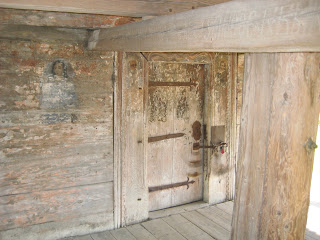In the afternoon, we headed to the town of Drohobych, which, compared to some of the other villages we saw, was more like a small city. It was built on a similar plan to L'viv, with a city hall building at the center of the market square. Here, though, some of the buildings around the perimeter of the square were rebuilt during Soviet time with particularly drab results.
 |
"Welcome to Drohobych"
 |
Market Square
 |
| City Hall |
|
 |
| The building on the right was once a synagogue, and now it's a boxing gym. |
 |
Sholom Aleichem Street.
 |
Street scene
 |
Placard honoring Ivan Franko, a famous Ukrainian writer from this area.
 |
Homeless dog
 |
Bustling street scene
 |
| Dad standing in front of a beautiful house. |
|
|
|
|
|
|
|
|
|
|
|
|
|
The main attraction, for us at least, was the enormous Choral Synagogue near the center of town, built in the 1860s. It's a hulk, completely gutted on the inside, but it's still standing. It was apparently used as a furniture store before being returned to the Jewish community. it is in the process of being restored, and people were working on the building. We were even able to go inside, which was really amazing to see, especially the faded Hebrew inscriptions still visible on the walls. I hope that during the restoration, someone will do research to analyze the walls and return them to their former condition. Interesting fact - because there was a height restriction, a lot of the synagogues in Galicia were built with the first floor below ground, so you enter down a set of stairs. That way, you could have the interior space as large as you wanted while still conforming to the height limits.
 |
| Synagogue exterior |
 |
| Interior w/ exposed support beam and another tour group - we were not the only visitors! |
 |
| vaulted ceiling |
 |
| Harold and Alex inside the synagoge |
 |
| wall inscriptions |
 |
| exterior close-up. |
Drohobych was also the home of the Polish-Jewish writer and author Bruno Schulz. We saw his birthplace, and to-called "Street of Crocodiles" that he wrote about in his most well-known book (in some editions, it's called "Cinnamon Shops"). In the local university, there's a small collection of Schulz artifacts, but the curator was out of town and we couldn't get inside. However, we did walk down the hallway to the sound of students in another room rehearsing a Viennese waltz - it was almost like we were being serenaded!
 |
| Apartment building |
 |
| Statute of a priest outside of the Catholic church near the center of town |
 |
| Plaque on Bruno Schulz's house in Ukrainian, Polish, and Yiddish |
 |
| Schulz's house |
 |
| Soviet statue |
 |
| Memorial for Holocaust victims |
 |
| Outdoor market |
 |
| Crocodile Street, circa 2010. |
Drohobych is also home to two beautiful vernacular wooden churches. The first one, St. Yuri's (St. George's) is operated as a state-run museum. The docent was there when we arrived, and she let us in (for a small fee) after opening up the chain lock with an enormous key. The interior was covered with frescoes of icons and depictions of biblical scenes. They frown on flash photography, so unfortunately I can't show you the inside - I bought myself a postcard.
We also went to a smaller wooden church, located on the grounds of a fire station. This church was privately owned, and we couldn't get inside, but there were some cool wooden cross-beams outside with written inscriptions.
After driving back to L'viv, we went to use the fitness center for a little much-needed exercise and then went out for another calorie-laden delicious dinner at a Polish restaurant, Kupol (Купол).
 |
| Awkward pose |
 |
| Dad on the patio |
 |
| Я люблю пиво! |







































That is an awkwardly hilarious pose, but I love that the picture looks so much like a vintage image in composition, tone, and texture. Neat.
ReplyDelete